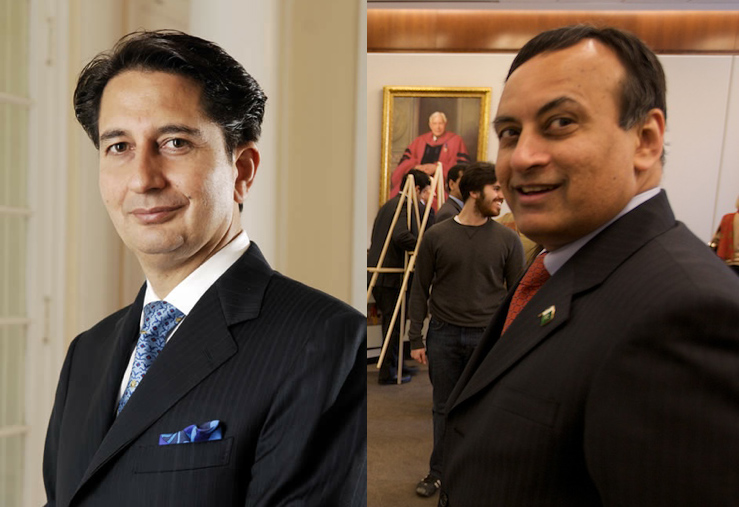Afghanistan, Pakistan Ambassadors Criticize Obama Strategy
A rare joint talk Thursday exposed some differences their countries have with the Obama administration’s new strategy to confront extremism in South Asia, as well as with each other.
Jul 31, 2020115.2K Shares2.6M Views
Said Jawad (Embassy of Afghanistan) and Husain Haqqani (Flickr: Micheal Foley Photography)
A rare joint talk by the Pakistani and Afghan ambassadors to the United States Thursday afternoon exposed some differences their countries have with the Obama administration’s new strategy to confront extremism in South Asia, as well as with each other.
Said Jawad, the Afghan ambassador to Washington, and Husain Haqqani, his Pakistani counterpart, gave a wide-ranging presentation at the Atlantic Council of the United States, an organization promoting greater transatlantic ties, in which both diplomats proposed modifications to the Obama administration’s approach to the region. Jawad urged international assistance for the expansion of the Afghan security forces, a major component of administration strategy, to nearly double the size of the administration’s proposal. Haqqani bridled at the prospect of his government having to meet benchmarks for the continued provision of billions of dollars of aid that Congress and the administration have proposed. American self-perceptions as a “can-do, fix-it nation” leads to an “attitude that the world is a problem for America to fix,” Haqqani said. “Please don’t try to fix us.”
Illustration by: Matt Mahurin
Jawad said his government “very much welcomed” the administration strategy to Afghanistan, which increases U.S. troops for the war there; accelerates the training of Afghan forces; and pledges wide-ranging support for a variety of developmental and governmental projects to stem the tide of insurgent violence. But he cited counterinsurgency theory — something that architects of the administration’s new strategy like Undersecretary of Defense Michele Flournoy have studied closely — to say that Afghanistan ultimately “will need 400,000 security forces” to secure the population against insurgents, including 250,000 soldiers. The administration announcedtwo weeks ago that it would bolster U.S. training and advisory programs to grow the Afghan national army to 134,000 soldiers and the national police force to 82,000 police by 2011.
Asked by TWI how long the expansion would take, Jawad estimated it would require “five to seven years.” He declined to cite a figure for how much the increase would cost. Absent the expansion, he said, “your soldiers will be dying [in Afghanistan] and we don’t like that.”
Jawad conceded that the Afghan police faced serious problems with their competence and their adherence to the law. In September, a TWI reporter in Afghanistan’s Paktia Province watched as Afghan policemen turned a joint U.S.-Afghan raid on a suspected Taliban safehouse into an opportunity to rob the house’s inhabitants, and forced the raid to come to a premature end when their U.S. partners refuse to let them loot the building. Asked by the panel’s moderator, Council President Frederick Kempe, whether Afghanistan needed to restart its police-training program from “scratch,” Jawad replied, “Unfortunately, yes.”
Haqqani, in an occasionally passionate talk, expressed frustration that the United States appeared to be dictating terms to Pakistan rather than treating it as a partner. Discussing recent reports that elements within the powerful Inter-Services Intelligence agency that sponsored the Afghan Taliban in the 1990s maintain a patron of extremists, Haqqani acknowledged “there is mistrust some of our security institutions” in Washington, but said the way to resolve those concerns was “by talking to us, not by beating on us.” He repeated the quote, he said, for the benefit of journalists in the room.
“Pakistan no longer lacks the will to fight terrorists and extremists,” said Haqqani, who was a close confidante of Benazir Bhutto, the former prime minister slain by al-Qaeda in December 2007.
Yet Haqqani made a case that the U.S. was insufficiently respectful of Pakistani sovereignty, even as Pakistani sovereignty is increasingly eroded by al-Qaeda and affiliated extremist groups that are holding territory in its western regions. On the subject of the controversial CIA-operated drones that fire missiles at suspected al-Qaeda and Taliban leaders — and which have caused dozens of civilian casualties — “it is easier for Pakistanis to accept American technology used to take out extremists and terrorist on Pakistani soil if it’s done in partnership with Pakistan,” he said, without elaboration.
He questioned the amount of aid that the U.S. proposes to devote to Pakistani civilian institutions — a soon-to-be-introduced Senate bill proposes $7.5 billion over five years — in light of the recent government programs to takeover insurance giant AIG at a cost of $85 billion and extend a lifeline to General Motors with loans worth $13.4 billion, saying that Congress “needs to revisit” the relatively small amount of aid to a country that the Obama administration calls part of the “central front” in the war on al-Qaeda. But Haqqani urged the United States not to apply strict benchmarks to the funding, as the administration has promised. “Pakistan understands the need for accountability,” he said. “At the same time, there is a difference between accountability and intrusiveness.” He suggested that U.S. expectations of Pakistani behavior ought to be expressed privately in diplomatic communications, not by “legislating morality.”
That opened up one of several areas of gentle disagreements between the two ambassadors. “In Afghanistan, we are in favor of benchmarks and transparency,” Jawad said, contending that those Afghan ministries subject to benchmarks from the U.S. and the international community perform better than those that aren’t.
Jawad also rebuked Haqqani somewhat over the question of Pakistan’s strategic attitude towards the extremists operating on its territory. Haqqani said that Pakistan understands that “terrorism poses a greater imminent threat to our survival than some of our traditional concerns,” a reference to U.S. concerns, expressed by Obama, that Pakistan needs U.S.-backed reassurances of security regarding its traditional enemy, India. Jawad replied that while he doesn’t doubt the counterterrorism sincerity of Pakistan’s civilian government, “the military in Pakistan has capabilities to deliver but perceives India as the main enemy, not extremism.”
Still, both praised each other as partners — Haqqani called Afghanistan and Pakistan “brothers” — and pledged to work closely with the Obama administration against a shared threat. The three nations need to “overcome a trust deficit of the past and achieve a future” based on an “enduring and lasting partnership,” Haqqani said.

Paula M. Graham
Reviewer
Latest Articles
Popular Articles

